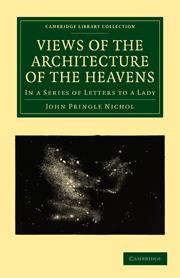Book contents
- Frontmatter
- Contents
- PLATES
- PART I THE FORM OF THE EXISTING UNIVERSE
- PART II THE CONSTITUENT MECHANISMS, OR THE PRINCIPLE OF THE VITALITY OF STELLAR ARRANGEMENTS
- LETTER IV Probable Universality of Planetary Systems—Relations of Stars to each other—Double Stars
- LETTER V Triple Stars—More Complex Relationships—Existence of Large Groups—Conjectures respecting Firmamental Systems
- PART III THE ORIGIN AND PROBABLE DESTINY OF THE PRESENT FORM OF THE MATERIAL CREATION
- NOTES
- Additions and Corrections
LETTER IV - Probable Universality of Planetary Systems—Relations of Stars to each other—Double Stars
Published online by Cambridge University Press: 29 August 2010
- Frontmatter
- Contents
- PLATES
- PART I THE FORM OF THE EXISTING UNIVERSE
- PART II THE CONSTITUENT MECHANISMS, OR THE PRINCIPLE OF THE VITALITY OF STELLAR ARRANGEMENTS
- LETTER IV Probable Universality of Planetary Systems—Relations of Stars to each other—Double Stars
- LETTER V Triple Stars—More Complex Relationships—Existence of Large Groups—Conjectures respecting Firmamental Systems
- PART III THE ORIGIN AND PROBABLE DESTINY OF THE PRESENT FORM OF THE MATERIAL CREATION
- NOTES
- Additions and Corrections
Summary
Returning homewards, through those profound abysses, to whose extremities we have adventured, and leisurely surveying the objects whose number and varieties struck us at first with an absorbing and most natural astonishment, we soon start the enquiry, What are these clusters doing?—What is their internal condition?—What their mechanisms?—And what the nature and affections of the bodies which compose them? It is manifest, that such investigations, in so far as we would rest them on observation, must be confined within our own cluster—the telescope, which has revealed the dim lustre of others, still failing to discriminate the peculiarities of their individual orbs; but if we analyze the system of which we form a part, and become familiar with the mode of its existence, a cautious use of the argument from analogy, will at least darkly illumine the obscurer objects which surround it.
I. In the first place, it is of importance to ascertain whether the stars are individually characterised by the same leading features, or—taking our Sun, which we know best, as a pattern object—whether and how far the distinct orbs of remote space may be accounted to resemble him? The old notion that these luminaries are of no significancy, except as ornaments to the earth, has lost hold, I believe, of all classes of minds, so that, assuming that the stars are also suns, shining like our luminary, of their own perennial virtue, we may step at once to consideration of the second or next higher point of probable resemblance,—are these myriads of suns encircled, like ours, by schemes of subservient planetary worlds?
- Type
- Chapter
- Information
- Views of the Architecture of the HeavensIn a Series of Letters to a Lady, pp. 63 - 97Publisher: Cambridge University PressPrint publication year: 2009First published in: 1837

